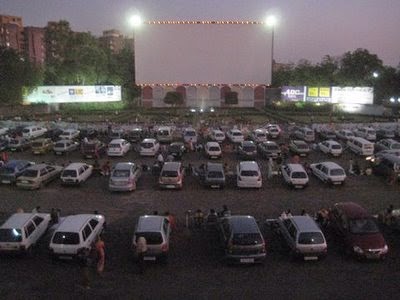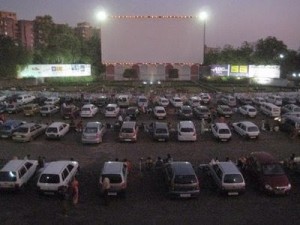By RAHUL DESAI (@ReelReptile)
I didn’t spend my childhood sneaking into cinema halls or bunking classes. I didn’t watch reruns of old classics endlessly while my parents slept. I was and still am disinterested in useless trivia that has nothing to do with contemporary cinema. I didn’t follow family members with a camera. I’d yawn as soon as I saw black-and-white images on screen. I didn’t splice filmstrips, invest in a tripod or take newspaper cutouts of my favourite directors. If my cable operator played a relatively new movie, I’d watch it only so that I’d be able to confidently contribute to a casual discussion in class the next morning. I certainly wasn’t charmed by the whir of machines projecting images onto a large white screen. When my father would ask me why I’d use the term ‘picture’ only when I spoke in Hindi, I’d respond with a nonchalant grunt that translated to “your Hindi is worse than mine.”
Down the line, I turned to movies because they became films for me.
I turned to films because I had nothing else to turn to. They comforted me, because they seldom evolved at a pace the rest of the world was moving forward at. I didn’t feel left behind. I didn’t feel the pressure to grow at an accelerated pace. Even the mediocre ones remained mediocre for a long time. I could understand plots, and even relate to some.
But I didn’t watch them for the fun of it. I watched them because they didn’t expect anything more from me. Moreover, I didn’t have to put up with a relentless rat race to watch my favorite actors. I didn’t have to feel guilty for walking out, moving on to other things and returning after a month. I don’t have to feel apologetic for not growing up, and finding meaning in the same images that made me laugh and cry as a child.
My love for films was born out of convenience, an arranged marriage of sorts, where lack of choice blossomed into an occasionally rip-roaring but largely long-term affair. There was no distance to worry about, no baggage to handle.
I got lucky with movies; I punched above my weight. She is the friend-turned-partner I was destined to have.
Thinking back though, the signs were there. In hindsight, as always, they’re easy to spot. The magic crept up on me, till it became a full-blast in-your-face declaration of quiet companionship.
Our romance was perhaps visible to anyone but us, and manifested itself in the littler, more innocent moments from my past.
Childhood visits to cinema halls were curiously olfactory experiences.
They revolved around smells, scents and aromas of artificial fresheners, air conditioners and salted popcorn; the strong perfumes of decked-up women treating evening shows as a frightfully happening social occasion; the stifling smell of heat when my mother allowed me to doze off in the backseat after a late show; the putrid stench of urine combining with strong aftershave in crowded restrooms; the hopelessly ill-conceived hope of spotting the school bully watching me with admiration from the confines of his screen-facing bedroom; the excitement of spotting familiar schoolmates outside of classroom environments, of spotting strict teachers in ‘free-dress’ clothes, with their families. They had families, just like I did. Or the heady anticipation of watching a girl I liked walk across the foyer with her giggly group of friends.
It was rarely about the actual movie for me. My mind was more of a movie than the movies I watched.
I do remember harbouring a tiny tinge of wide-eyed wonder though—a dreamy outlook, or just plain naïve dumb hope. I believed in a highly unlikely scenario, just like most children believe in Santa Claus till they’re old enough to let their dreams become footnotes to peer pressure.
I’d watch movies at the country’s only drive-in theatre seated in a cramped car full of dodgy snacks. Smells of pav bhaji and wafer packets wafted through the air. Strategically placed rickety metal speakers stood in between parked vehicles, blaring out sounds of the movie into each open window. Pot-bellied patriarchal heads rested on their windshields, telling their kids to sit on the picnic-sprawled cloth and gaze upward. Canteens boomed to life behind the cars during 30-minute freewheeling intervals. Engines roared to life before the last scene ended, determined to miss out on the 3-hour-in-the-making payoff to avoid routine traffic snarls at midnight. Indians who stand up and head for the exit before the airplane taxes will understand this brand of self-defeating behaviour.
All throughout, I wondered if the actors were actually behind the glass screen, performing in live magical studio environments to a live audience. How did they change clothes so soon? How did that field turn into a house? The production unit and stagehands must be a competent lot. After the movie was over, I’d try to convince my folks to stay till after the end credits. Because I wanted to watch the actors step out from behind the screen, and stand on top to take a bow.
This was around the same time I believed that every move I made in my life, every expression I gave, every line I spoke and every tear I shed was actually being captured by hidden cameras; that my life was being broadcasted in real-time to the world as the greatest biopic ever made. I believed this to an extent where I’d rehearse my words in a mirror, and make sure I don’t look utterly stupid while walking down the road. I’d even play certain shots as a batsman that would absolutely merit a slow-motion action replay, so that my audience doesn’t miss out on a single dramatic moment. I’d even bury my face in my hands, or turn my eyes away from the invisible screen when I cried. Nobody should see their hero break down. As it turned out, the creators of The Truman Showseemed to have had the same preposterous estimation of self-worth; the only difference being, they turned it into a deeply moving film with incredible foresight about the horrors of reality television shows.
There was also a time when I had convinced exactly one and a half people around me that we were actually part of a shared dream, and any moment then, we’d wake up from a deep night’s sleep to realise we’re already 70 and existing without any purpose. And that everything we’re living is not real; a lucid stream of surprisingly seamless memories that hasn’t ended yet. I knew I’d wake up one morning and pleasantly discover that there is no school to go to, no exam to be tense about, and the life I knew was a lie. That I’ve been there, done it all.
I kept waiting for the moment I’d fall off the bed and come back to reality.
It never happened.
In a way, I’m still waiting.
This is a nice dream to have. The detailing is immaculate, the kisses so real, the emotions raw, and the illusion of life passing by seems to be captured by Linklater himself. I can feel each frame, and breathe life into any scene I choose to.
Why wake up when it makes for a deeply personal, original and more authentic movie than any I’ve ever watched?
(Rahul blogs about films, life and everything in between at hyperbola86.blogspot.in)





Leave A Comment
You must be logged in to post a comment.